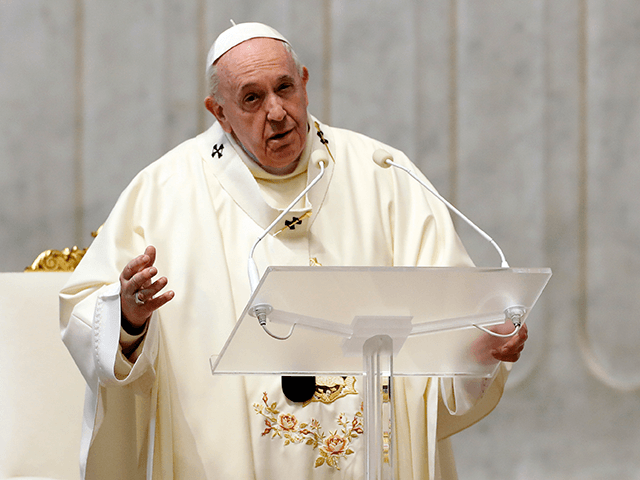ROME — Pope Francis criticized populism as “political paternalism” Thursday, asserting it deprives the people of self-rule.
Populism — consciously or unconsciously — follows the inspiration of the motto: “Everything for the people, nothing with the people,” or “political paternalism,” the pope declared in a video message transmitted to participants in an international conference on “A Politics Rooted in the People.”
“Hence, in the populist vision, the people are not the agents of their own destiny, but end up being indebted to an ideology,” the pontiff said.
The “true response to the boom of populism is not precisely more individualism but its opposite: a politics of brotherhood, rooted in the life of the people,” he added.
“When the people are discarded, they are deprived not only of material well-being but also of the dignity of acting, of being the agent of their history, of their destiny, of expressing themselves with their values and culture, of their creativity, of their fruitfulness,” he insisted.
A policy that ignores the poor “can never promote the common good,” Francis said. “A politics that ignores the peripheries will never understand the center and will confuse the future with projecting itself through a mirror.”
“One way to ignore the poor is to despise their culture, their spiritual values, their religious values, either by discarding them or exploiting them for the purpose of power,” he continued. “Contempt for popular culture is the beginning of the abuse of power.”
The pope’s rejection of populist nationalism is united to his belief that the world can only move forward by adopting a multilateral system of governance.
Our own days seem to be showing “signs of a certain regression,” the pope wrote in his 2020 encyclical letter titled Fratelli Tutti (Brothers All). “Ancient conflicts thought long buried are breaking out anew, while instances of a myopic, extremist, resentful, and aggressive nationalism are on the rise.”
“In some countries, a concept of popular and national unity influenced by various ideologies is creating new forms of selfishness and a loss of the social sense under the guise of defending national interests,” the pontiff wrote in the letter.
As he has done on other occasions, Francis associated renewed nationalist sentiment to xenophobia, narrow-mindedness, and selfishness.
There are those “who appear to feel encouraged or at least permitted by their faith to support varieties of narrow and violent nationalism, xenophobia and contempt, and even the mistreatment of those who are different,” the pope said. “Faith, and the humanism it inspires, must maintain a critical sense in the face of these tendencies, and prompt an immediate response whenever they rear their head.”
“Narrow forms of nationalism are an extreme expression of an inability to grasp the meaning of… gratuitousness,” Francis wrote. “They err in thinking that they can develop on their own, heedless of the ruin of others, that by closing their doors to others they will be better protected.”
“Sadly, politics today often takes forms that hinder progress towards a different world,” namely, populism.
The attempt to see populism as a key for interpreting social reality is “problematic,” Francis asserted, because it “disregards the legitimate meaning of the word ‘people,’” which necessarily entails “communitarian aspirations” and “shared goals that transcend their differences.”
The promotion of “popular” leaders “can degenerate into an unhealthy ‘populism’ when individuals are able to exploit politically a people’s culture, under whatever ideological banner, for their own personal advantage or continuing grip on power,” he said. “Or when, at other times, they seek popularity by appealing to the basest and most selfish inclinations of certain sectors of the population.”
In 2018, the pope had harsher words still, insisting that populism is born of hate.
“It is important for young people to know how populism is born,” the pope said. “I think of Hitler in the last century, who had promised development for Germany. They should know how populisms begin: by sowing hate. You can’t live sowing hate.”
Increased efforts are needed to teach the young about the history of the First and Second World Wars “so they do not fall into the same error and so they know how populism spreads,” he said.

COMMENTS
Please let us know if you're having issues with commenting.